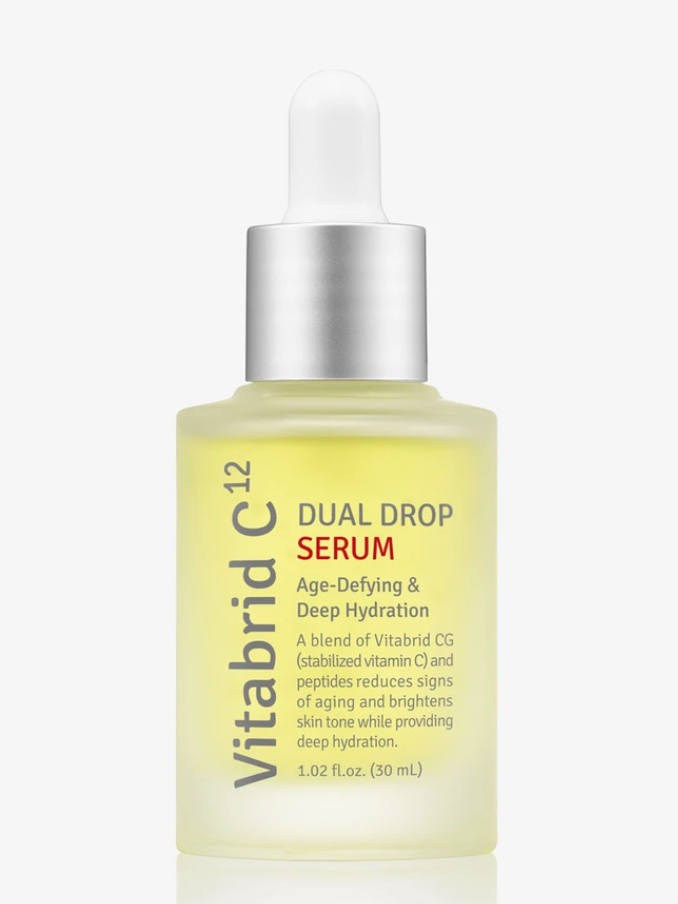Why You Need To Be Using A Vitamin C Serum, According To A Derm
Touting the virtues and benefits of vitamin C feels needlessly gratuitous when most of us already know them. It's why some of us start the day with an energizing glass of orange juice. It's why others chug an immune-boosting vitamin C powder drink to fight an incoming cold. It's why, from an early age, we're trained to learn vitamin C's immensely vital role (and why one particular artist chose it, of all the vitamins, to be her onstage moniker). Vitamin C is important — it's a fact that's deeply ingrained in our subconscious.
And yet, when it comes to skin care, vitamin C is less known than, say, sunscreen (to prevent skin cancer) or retinol (for faster skin cell turnover). "Retinol is an ingredient that we use for anti-aging and for acne, so more people are familiar with the product — not so much with vitamin C," confirms Shari Sperling, DO, a New Jersey-based dermatologist, who estimates that about 80% of her patients don't use a vitamin C serum until she recommends one. "Sunscreen, a vitamin C serum, and retinol are the products I always stress. They're the most important ones."
AdvertisementADVERTISEMENT
But she believes that, increasingly, more people are becoming aware of implementing vitamin C in their skin-care routines, pointing to media attention, celebrities sharing their beauty routines, and the abundance of varying vitamin C beauty products on the market as reasons for the shift. Here, Dr. Sperling breaks down everything you need to know about vitamin C — why it's an integral part of your beauty routine, what you should be looking for, and more.
Vitamin C has a plethora of skin benefits.
"Vitamin C is a potent natural antioxidant that promotes healthy skin by fighting and neutralizing free radicals — elements that cause damage — in the skin and protecting it from oxidative distress, like pollution and cigarette smoke. It has anti-inflammatory properties, so it can help with acne; it evens out skin discoloration and hyperpigmentation by inhibiting melanin synthesis through an enzyme; it helps stimulate collagen production, which helps with wrinkles and fine lines; and it brightens, so your skin will look smoother, glowy, energized, and healthy. Everyone’s all about about eating foods that are enriched with antioxidant properties. Vitamin C is the topical version of that. And because it's so versatile, it's for everyone."
The most effective vitamin C formula is a serum.
"There are so many different vitamin C products out there, but I suggest a serum because it's more concentrated and the absorption is better. Some people are sensitive to serum or they don’t like the feeling of a serum's texture, so they’d prefer a cream. I would rather have them use a vitamin C cream than nothing at all."
AdvertisementADVERTISEMENT
Not all vitamin C products are created equal.
"It's not enough for a product to have vitamin C on the label — you want the active ingredient in its most stable form, which is L-ascorbic acid. The percentage of L-ascorbic acid should be between 10 and 20%. Under 8% isn't enough and over 20 is going to cause irritation. Look for air-tight packaging and store it away from light, otherwise the active ingredient can break down."
Our pick: this hero product by Korean cosmeceutical brand Vitabrid C¹² called Dual Drop Serum, which boasts an innovative blend of a patented form of stabilized vitamin C and peptides to smooth lines, brighten, and hydrate. And because it's designed to release vitamin C over time (as opposed to all at once) to effectively penetrate the skin's bilayers, this advanced formula won't cause irritation, making it exempt from the 10 to 20% rule. It's beloved for its non-tacky, non-sticky texture; its lack of fragrance; and its immediate results. (The serum is so popular that one is reportedly sold every 2 minutes and 37 seconds in Korea.)
When it isn't stable, it won't work.
"Vitamin C needs to have an acidic pH for it to work, but because it's unstable, adding in ingredients like vitamin E and ferulic acid helps lower the pH and make it more stable. If vitamin C starts breaking down, stop using it. You'll know when it's happening because it will start changing color — an orange-y tint — so you want to keep an eye out for it."
AdvertisementADVERTISEMENT
Contrary to popular belief, you can use vitamin C with retinol.
"We used to say you can't use vitamin C with retinol because they'll cancel each other out, but now there's literature that says you can. Use vitamin C first, wait 30 minutes, and then apply retinol."
But if you don't want to wait 30 minutes to complete your skin-care routine...
"Then use vitamin C in the morning. Cleanse your face before applying a vitamin C serum, a moisturizer, and then sunscreen. And swap vitamin C for retinol at night. I recommend using vitamin C at least once a day. And when you apply, a little goes a long way — two or three drops are all you need."
It's never too late to start using vitamin C.
"If you have a beauty routine, then a vitamin C serum has to be in there. It's essential if you're in your 30s, but I've seen people in their 20s use it as well. I've had patients tell me they've seen results in a few days, but you can definitely see the effects in a few weeks."
And vitamin C is for all skin types.
"If you're allergic or sensitive to vitamin C or other ingredients in the formula, be careful — side effects include redness and itchiness. But typically, vitamin C benefits all skin types. And because it's usually sold in its purest form, there shouldn't be an issue."
AdvertisementADVERTISEMENT








